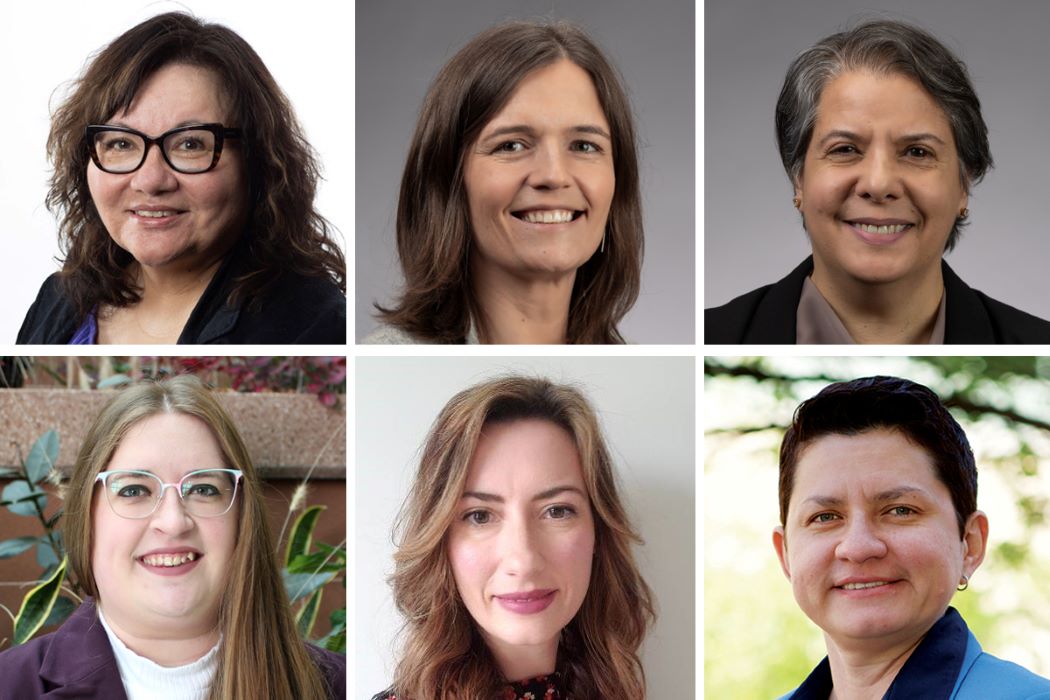
TOP ROW (L TO R): RHONDA CAMPBELL, DR. ANNA CHUDYK, DR. ASMAA HAIMEUR. BOTTOM ROW (L TO R): MIKAYLA HUNTER, KIMBERLEY MACKAY, DR. DIANA SANCHEZ-RAMIREZ.
Inspiring inclusion: Rady reflections on International Women’s Day
On March 8, International Women’s Day, people around the world celebrate the social, economic, cultural and political achievements of women.
The day also focuses on taking action against bias, stereotypes and discrimination while working to achieve the equity and inclusion of everyone who identifies as a girl or woman.
This year’s international theme for the day is “Inspire Inclusion.”
We asked members of UM’s Rady Faculty of Health Sciences community to reflect on this theme in the context of the Rady Faculty.
Mikayla Hunter is a master’s student in community health sciences in the Max Rady College of Medicine and founding president of the Queer & Trans Graduate Student Group.
“I identify as a non-binary woman, which means that I identify both as a woman and as non-binary,” they said. “International Women’s Day should be inclusive of all women, including trans women, who experience immense discrimination. To inspire inclusion, we need to make sure that our efforts are anti-racist, anti-homophobic, anti-transphobic and anti-ableist.
“One change that comes to mind is the need to provide free menstrual products in washrooms on campus. Menstrual equity is essential to enabling women and non-binary folks to participate equally in their work and their studies.”
Dr. Diana Sanchez-Ramirez is an assistant professor of respiratory therapy in the College of Rehabilitation Sciences.
“The invaluable contributions made by women deserve proper recognition and should serve as a source of inspiration for girls,” she said.
“To inspire inclusion in the Rady Faculty of Health Sciences, all members of our faculty must refrain from perpetuating traditional gender biases and make active efforts to establish an inclusive environment where the contributions of every individual are valued and respected equally.
“Women across the Rady Faculty need to feel empowered and encouraged to express their opinions and actively engage in leadership roles.”
Rhonda Campbell is an Anishinaabe instructor in the College of Nursing who directs Mahkwa omushki kiim: Pathway to Indigenous Nursing Education (PINE), a unit that supports Indigenous students in obtaining their bachelor of nursing and becoming registered nurses.
“I’m encouraged by the work being done at the College of Nursing to address Calls to Action 23 and 24 made by the Truth and Reconciliation Commission [calling for more Indigenous professionals in health care, retention of Indigenous health workers in Indigenous communities, and cultural competency training for health-care professionals; and calling on medical and nursing schools to educate all students in Indigenous health],” she said.
“In terms of women’s equity and inclusion, we have women students in our PINE unit who have family responsibilities. They may be juggling part-time employment and childcare. We help them to access the financial, cultural and academic supports they need during their educational journey to become nurses.”
Dr. Anna Chudyk is an assistant professor in the College of Pharmacy.
“To me, ‘inspire inclusion’ calls for the purposeful co-creation of environments where all individuals who self-identify as women are supported to thrive to their full potential and achieve the goals and positions that matter to them,” she said.
“Those who self-identify as women in the Rady Faculty should have opportunities to weigh in, through methods such as town halls and surveys, on how Rady can ‘inspire inclusion.’ And Rady Faculty leadership should commit to working with them to transform the information gathered into timely and measurable change.”
Dr. Asmaa Haimeur is an assistant professor of restorative dentistry and director of equity, access and participation in the Dr. Gerald Niznick College of Dentistry.
“Inspiring inclusion means empowering women to speak up, to participate and to apply for leadership roles,” she said. “We must create welcoming and supportive learning and working environments where women can reach their full potential.
“We need to understand and work toward removing barriers that women still encounter daily; evaluate and improve upon policies and practices that affect women’s learning and working experiences; and establish or promote mentorship programs that support women in their career paths.”
Kimberley MacKay is director of undergraduate nursing programs in the College of Nursing.
“Inspiring inclusion means empowering women and gender-diverse folks, particularly BIPOC [Black, Indigenous and People of Colour] individuals, to pursue leadership roles,” she said.
“There is a need for leadership positions in the Rady Faculty that are designed for women from minority populations and gender-diverse folks to have a seat at the table where decisions are made. This would help to make decisions more inclusive and understanding of the needs of a broader community.
“To address gender inequalities, we need to ensure that we’re teaching the values of inclusion and diversity to our children right from the start.”






